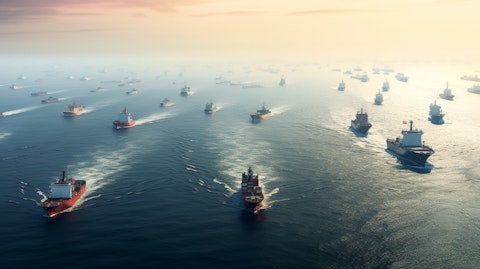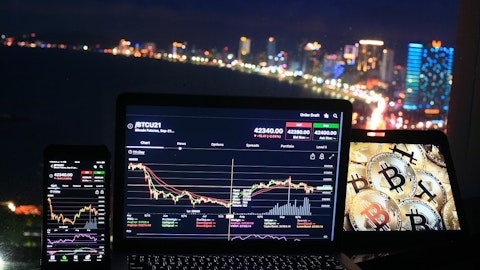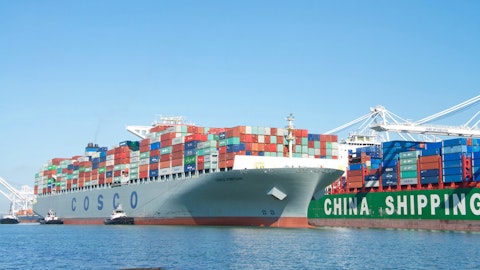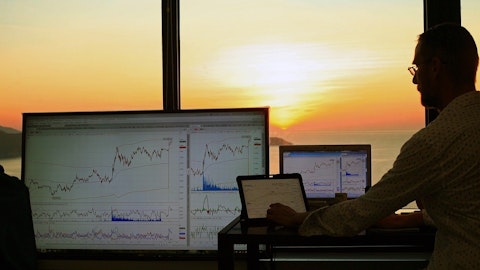Danaos Corporation (NYSE:DAC) Q3 2023 Earnings Call Transcript November 14, 2023
Operator: Good day, and welcome to the Danaos Corporation conference call to discuss the Financial Results For The Three Months Ended September 30, 2023. As a reminder, today’s call is being recorded. Hosting the call today is Dr. John Coustas, Chief Executive Officer of Danaos Corporation; and Mr. Evangelos Chatzis, Chief Financial Officer of Danaos Corporation. Dr. Coustas and Mr. Chatzis will be making some introductory comments, and then we will open the call to a question-and-answer session. Please go ahead.
Evangelos Chatzis: Thank you, operator, and good morning to everyone. Before we begin, I quickly want to remind everyone that management’s remarks this morning may contain certain forward-looking statements and that actual results could differ materially from those projected today. These forward-looking statements are made as of today, and we undertake no obligation to update them. Factors that might affect future results are discussed in our filings with the SEC, and we encourage you to review these detailed safe harbor and risk factor disclosures. Please also note that where we feel appropriate, we will continue to refer to non-GAAP financial measures such as EBITDA, adjusted EBITDA and adjusted net income to evaluate our business.
Reconciliations of non-GAAP financial measures to GAAP financial measures are included in our earnings release and accompanying materials. With that, let me now turn the call over to Dr. John Coustas, who will provide the broad overview of the quarter. John?
John Coustas: Thank you, Evangelos. Good morning, and thank you all for joining today’s call to discuss results for the third quarter of 2023. The macroeconomic environment continued to deteriorate during the third quarter of 2023 and container transport stagnated in most areas due to continued inventory destocking and weak retail sales. As a result, profitability of liner companies has dramatically decreased, and major operators have announced sweeping cost cutting measures. The chartering market continued to remain under pressure, particularly in the market for vessels smaller than 3,000 TEU, where charter rates returned to pre-pandemic levels. In larger vessel segments, charter rates have remained relatively stable given the scarcity of open tonnage for next year, a factor that has enabled us to forward fix all our vessels above 10,000 TEU on three-year charters at profitable levels that will commence after expiry of existing charter contracts in 2024.
As a result, our charter cover for 2024 has increased to 90%. Separately, through the date of this release we have taken delivery of the first four capesize bulk carriers and we have achieved rates well ahead of our expectations. While we do not expect a sustained upwards momentum in charter rates in the near term, we will closely monitor the dry bulk market and opportunistically pursue opportunities to expand our presence in this market. The resilience of our business model has been confirmed by the continuation of our solid results despite the significant fall in the charter market. Our strategy of delevering has also been effective and well timed as we have not been impacted by higher interest rates. Our charter backlog of $2.5 billion in contracted revenue also provides us with significant cash flow visibility and allows us to maintain flexibility in our capital allocation policy.
In this regard, we decided to increase our quarterly dividend to $0.80 per share and also to authorize an additional $100 million in share buybacks as our initial $100 million authorization has been almost exhausted. Due to the prudent execution of our strategy, we have been able to return over $200 million to our shareholders over the last 18 months and simultaneously grow our fleet in the container segment by placing 10 new building orders and create exposure to the dry bulk segment through investments in companies and vessels. We will strive to continue to create value for all our shareholders while ensuring the long-term prosperity of Danaos. With that, I’ll hand the call back over to Evangelos, who will take you through the financials for the quarter.

Evangelos?
Evangelos Chatzis: Thank you, John, and good morning again to everyone. I will briefly review the results for the quarter and then open the call to Q&A. This quarter, we are reporting adjusted EPS of $7.26 per share or adjusted net income of $143 million compared to adjusted EPS of $8.71 per share or $176.9 million for the third quarter of 2022. This $33.9 million decrease in adjusted net income between the two quarters is primarily the result of the $23.2 million ZIM dividend that had been recognized in our income statement during the third quarter of 2022, and it’s no longer applicable as we have now sold all of ours ZIM shares. Otherwise, our adjusted net income was further affected by a $20.8 million drop in operating revenues, mainly due to noncash revenue recognition accounting and that was partly offset by a reduction of $10 million in our net finance expenses, which was driven by the significant deleveraging of our balance sheet.
Vessel operating expenses increased by $300,000 to $39.5 million in the current quarter compared to $39.2 million in the third quarter of 2022, as a result of the increase in the average daily vessel operating cost that increased to $6,500 per vessel per day for the current quarter from $6,173 per day for the corresponding quarter of 2022, and that is related to inflationary pressures that have affected repairs and maintenance costs as well as increased insurance premiums. Our operating costs continue however, to remain among the most competitive in the industry. G&A expenses decreased slightly to $7.1 million in this quarter compared to $7.2 million in the third quarter of 2023. Interest expense, excluding finance costs, amortization dropped by $9.3 million to $3.8 million in the current quarter compared to $13.1 million in the third quarter of 2022.
The increase – the decrease in interest expense is the combined result of a $5.8 million decrease because of a decrease in the average indebtedness by $549 million between the two periods, which was partially offset by an increase in the cost of debt service by approximately 2.2% as a result of rising interest rates. Additionally, we had a $3.5 million decrease in interest expense due to capitalized interest on our vessels under construction, which is the 10 new buildings we have on order. At the same time, interest income came in at $3.1 million, effectively covering over 80% of our interest expense for the quarter. Adjusted EBITDA decreased by 16.5% or $35.1 million to $178 million in the current quarter from $213.1 million in the third quarter of 2022, primarily as previously discussed, due to the $23.2 million ZIM dividend that have been recognized and it’s no longer applicable.
The other EBITDA drivers have already been outlined earlier on this call. We also encourage you to review our updated investor presentation that is posted on our website as well as subsequent events disclosures. A few of the highlights are the following. Over the past three months, we have secured $178 million of contracted revenue through the arrangement of new charters for six container ships in our fleet, and these new features notably include additional contracted revenues of $103 million for 13,000 [ph] TEU vessels and 68 million for 10,000 TEU vessels. As a result, our contracted revenue backlog currently stands at $2.5 billion, with a 3.2-year average charter duration while contract coverage is now at 100% for 2023 and 90% for 2024. Our investor presentation has analytical disclosure on our contracted charter book.
As of September 30, 2023, our net debt was down to $111 million. In the current interest rate environment, this position shields us from high interest costs. Additionally, the company’s net debt to adjusted EBITDA ratio stood at 0.16 times, while 48 out of our 72 vessels are currently unencumbered and debt-free. Finally, as of the end of the third quarter, cash was at $306 million, while total liquidity, including availability under our revolving credit facility, stood at $655 million, giving us ample flexibility to pursue accretive capital deployment opportunities. With that, I would like to thank you for listening to this first part of our call. Operator, we are now ready to open the call to Q&A.
See also 10 Best Auto Stocks To Buy and Stocks On the Rise: 12 Best Stocks To Buy.
Q&A Session
Follow Danaos Corp (NYSE:DAC)
Follow Danaos Corp (NYSE:DAC)
Receive real-time insider trading and news alerts
Operator: Thank you. [Operator Instructions] Today’s first question comes from Omar Nokta with Jefferies. Please go ahead.
Omar Nokta: Thank you. Hi, John, Evangelos. Good afternoon. Nice quarter, definitely some good updates, especially those forward fixtures you just highlighted. And it looks like you guys are feeling quite confident with things, especially given that you’ve been active with the buyback. You just announced a few buyback. You have the backlog that’s $2.5 billion. And it sounds like you obviously have quite a bit of flexibility going forward with the low debt you just outlined, Evangelos. In terms of how you see opportunities ahead clearly, there – you have the firepower of the muscle to go out and do more. If you so choose, just want to get your sense at the moment if there’s a preference as you think about the opportunities that are ahead what’s attractive.
Do you think there’s more to do on the dry bulk side of things? Is that where you want to deploy more capital on an opportunistic basis? Or do you think there are some opportunities that are starting to showcase themselves in the container market?
John Coustas: Yes. Morning Omar. We are – as you said, we have ample fire power when we identify opportunities to pursue them. And we are actually pursuing opportunities, both in the container sector and in the dry bulk. In the dry bulk, as we already said, we have identified our strategy that we like the Cape sector where we have invested. And also in the smaller sector rather than investing directly in ships, we have taken a significant position in Eagle Bulk. In terms of the containers, we are looking at both further opportunities in the new building front and also maybe some opportunities of – in modern eco vessels in the secondhand front. And – yes, we’ll take it from there. We are not in a rush. In general, we see a lot of uncertainty going forward. And we must be sure really that we are at or near, we would say, the bottom of the market in order to start engaging in the larger scale.
Omar Nokta: Yes. Makes sense, John. Thank you. And maybe just a follow-up just to that point regarding the opportunities you’re looking at. You mentioned the new buildings and the modern eco vessels. I know in the past, especially maybe in the sort of period of downshift from a strong market to a softer one over the past maybe year and a half or so, there hasn’t really been much in the – or much liquidity in that modern eco side in terms of transactions. Are you seeing that pick up? Is there more activity? Or is there at least more maybe inquiry ahead versus maybe what we saw six months ago?
John Coustas: Well, we’ll start seeing opportunities. There are companies that – let’s say, have bought vessels and kind of chartered ZIM [ph] companies that have not been, let’s say, long-term players in the market. And well now in 2024, they see that the charters are kind of expiring and the environment is not going to be very good for the charter. They are looking to disengage from this sector. And there are a number of say opportunities flow in the route.
Omar Nokta: Thank you. And one just final one for me. John, some of the things that we’ve started to see a bit more of, not a big scale, but as the liners coming to the ship owners and requesting relief perhaps or maybe just more amendments on the charters and basically the amend and extend approach. Are you seeing that coming your way? Did it look – then it seemed to be any sort of indication of that in your fleet list, but just wanted to get a sense from you. Are you seeing any amend in extend? And if so, how do you think that shakes out for Danaos in terms of an NPV basis?




